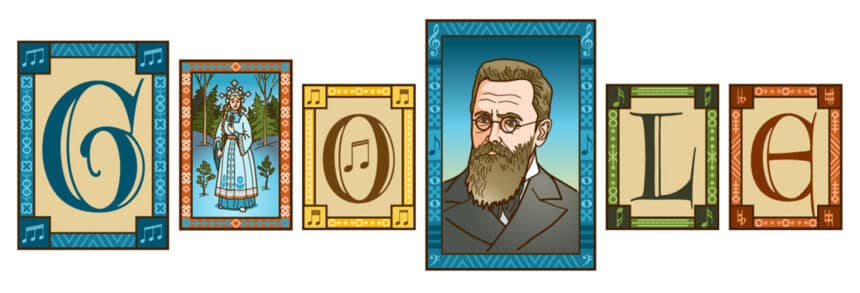Image Courtesy: Google Doodle
Nikolai Rimsky-Korsakov (18 March 1844 – 21 June 1908) was a Russian composer, a member of the group of composers known as The Five, a group of prominent 19th-century Russian composers who sought to create a distinctive national style of classical music.
Life and Career
He was born on 18 March 1844 in in Tikhvin, a small town in the Novgorod province of Russia. His father was a government official, and his mother was a well-educated woman who played piano and sang. Rimsky-Korsakov showed an early talent for music and began studying piano and violin at a young age.
In 1856, he entered the Naval Cadet Corps in St. Petersburg, where he continued his musical studies and began composing. After graduating in 1862, he served in the Russian Navy for several years but remained active in music, playing violin in an amateur orchestra and composing in his spare time.
In 1871, Rimsky-Korsakov met the composer Mily Balakirev, who became his mentor and introduced him to other members of “The Five”, including Modest Mussorgsky and Cesar Cui. Together, they sought to create a distinctive Russian style of classical music that was free from the influence of Western European music.
Rimsky-Korsakov’s compositions from this period, such as the “Russian Easter Festival Overture” and the symphonic poem “Sadko”, reflect his interest in Russian folk music and his use of exotic musical elements.
In addition to his work as a composer, Rimsky-Korsakov was a respected teacher and served as professor of composition and orchestration at the St. Petersburg Conservatory from 1871 to 1905. His students included Igor Stravinsky and Sergei Prokofiev.
Rimsky-Korsakov continued to compose throughout his life, and his later works, such as the operas “The Tsar’s Bride” and “The Legend of the Invisible City of Kitezh”, are considered to be among his finest. He died on 21 June 1908, in Lyubensk, near St. Petersburg.
Award and Legacy
During his lifetime, Nikolai Rimsky-Korsakov was widely regarded as one of the leading composers of his generation in Russia. He was awarded the Order of St. Vladimir and the Order of St. Stanislaus for his contributions to Russian culture, and he was also elected to the Russian Academy of Sciences.
Rimsky-Korsakov’s influence on the development of Russian classical music was significant, both through his own compositions and his work as a teacher. He was a key figure in the formation of “The Five” and their efforts to create a distinctive national style of classical music, and he inspired a new generation of Russian composers who followed in his footsteps.
His legacy can be seen in the works of his students, such as Igor Stravinsky and Sergei Prokofiev, as well as in the broader tradition of Russian classical music. His colorful orchestration and use of exotic musical elements continue to captivate audiences today, and his works are regularly performed and recorded by orchestras around the world.
On 18 March 2014, Google celebrated Nikolai Rimsky-Korsakov’s 170th Birthday with a doodle.

